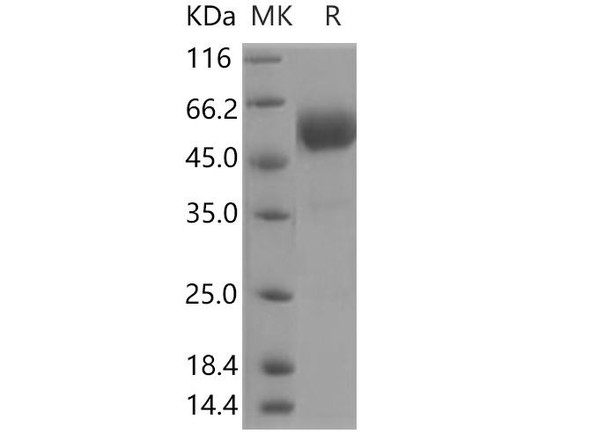Description
| Product Name: | Recombinant Human Cripto-1 Protein (Fc Tag) |
| SKU: | RPES8353 |
| Size: | 20μg |
| Tag: | C-Fc |
| Reactivity: | Human |
| Expression Host: | Mammalian |
| Accession: | P13385 |
| Sequence: | Leu31-Ser169 |
| Calculated Molecular Weight: | 40.2 kDa |
| Observed Molecular Weight: | 40 kDa |
| Synonyms: | TDGF, Teratocarcinoma-derived growth factor, Epidermal growth factor-like cripto protein CR, TDGF1, CR, CRGF, CRIPTO, Cripto-1 growth factor, Epidermal growth factor-like cripto protein CR1, Teratocarcinoma-derived growth factor 1, Cripto 1, Cripto 1 growth factor, Cripto1 growth factor, Epidermal growth factor like cripto protein CR1, TDGF 1, Teratocarcinoma derived growth factor 1 |
| Endotoxin: | < 1.0 EU/mg of the protein as determined by the LAL method |
| Purity: | > 90% as determined by reducing SDS-PAGE. |
Cripto/TDGF1 is a member of the epidermal growth factor (EGF)-Cripto , Frl-1 , and Cryptic (CFC) family. EGF-CFC family member proteins share a variant EGF-like motif , a conserved cysteine-rich domain , and a C-terminal hydrophobic region. Before gastrulation , Cripto is asymmetrically expressed in a proximal–distal gradient in the epiblast , and subsequently is expressed in the primitive streak and newly formed embryonic mesoderm. These proteins play key roles in intercellular signaling pathways during vertebrate embryogenesis. Mutations in Cripto/TDGF1 can cause autosomal visceral heterotaxy. Cripto/TDGF1 is involved in left-right asymmetric morphogenesis during organ development. Cripto signalling is essential for the conversion of a proximal–distal asymmetry into an orthogonal anterior–posterior axis. The mechanism of inhibitory effects of the Cripto includes both cancer cell apoptosis , activation of c-Jun-NH(2)-terminal kinase and p38 kinase signaling pathways and blocking of Akt phosphorylation. Thus , Cripto is a unique target , and Immunohistochemistry to Cripto could be of therapeutic value for Human cancers.
| Bio-activity: | Not validated for activity |
| Formulation: | Lyophilized from a 0.2 μm filtered solution in PBS with 5% Trehalose and 5% Mannitol. |
| Reconstitution: | It is recommended that sterile water be added to the vial to prepare a stock solution of 0.5 mg/mL. Concentration is measured by UV-Vis. |
| Storage: | Generally, lyophilized proteins are stable for up to 12 months when stored at -20 to -80℃. Reconstituted protein solution can be stored at 4-8℃ for 2-7 days. Aliquots of reconstituted samples are stable at < -20℃ for 3 months. |
| Shipping: | This product is provided as lyophilized powder which is shipped with ice packs. |






